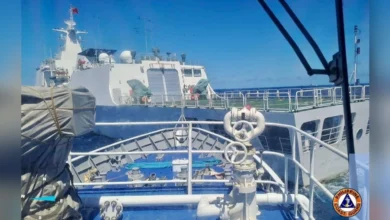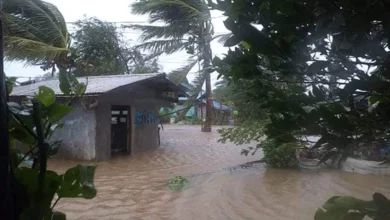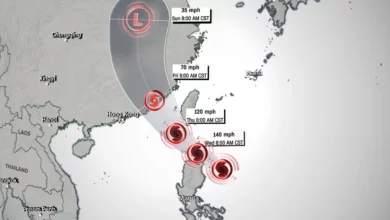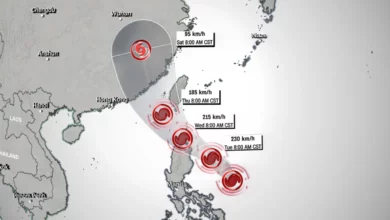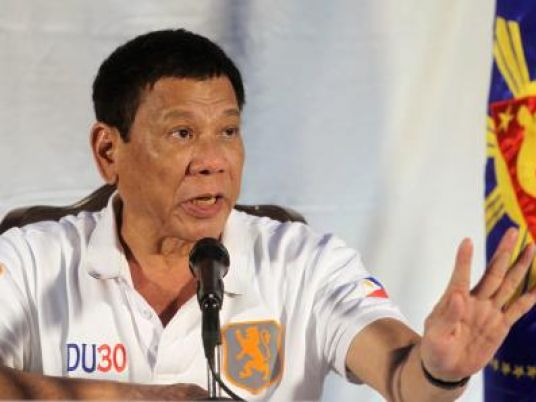
The Philippines scrambled to defuse a row with the United States on Tuesday and its new president, Rodrigo Duterte, voiced regret for calling President Barack Obama a "son of a bitch", comments that prompted Washington to call off a bilateral meeting.
The tiff between the two allies overshadowed the opening of a summit of East and Southeast Asian nations in Laos.
Duterte has bristled repeatedly at criticism over his "war on drugs", which has killed about 2,400 people since he took office two months ago, and on Monday said it would be "rude" for Obama to raise the human rights issue when they met.
Such a conversation, Duterte told reporters, would prompt him to curse at Obama, using a Filipino phrase "putang ina" which can mean "son of a bitch" or "son of a whore".
After Washington called off Tuesday's bilateral meeting between Obama and Duterte in response, the Philippines issued two statements expressing regret.
"President Duterte explained that the press reports that President Obama would 'lecture' him on extrajudicial killings led to his strong comments, which in turn elicited concern," the Philippines government said in one statement.
"He regrets that his remarks to the press have caused much controversy," it added. "He expressed his deep regard and affinity for President Obama and for the enduring partnership between our nations."
The White House had earlier said Obama would not pull any punches on his concerns about human rights abuses in the Philippines, its treaty ally, when meeting Duterte.
It was not immediately known if the bilateral meeting between the two president would be rescheduled.
Instead of the Duterte meeting, Obama plans to hold talks with South Korean President Park Geun-hye, said Ned Price, spokesman for the White House National Security Council – a meeting where the response to North Korea's latest missile tests is expected to be on the agenda.
Moves to smoothe tensions
Obama arrived in Vientiane just before midnight on Monday for the first visit by a sitting U.S. president to Laos, where he wants to begin to address the legacy of U.S. bombing during the Vietnam War.
He announced on Tuesday that the United States would provide an additional $90 million over the next three years to help Laos, heavily bombed during the Vietnam War, clear unexploded ordnance, which has killed or wounded more than 20,000 people.
The unusually open tensions between the United States and the Philippines, its former colony and long-term ally, threaten to overshadow the Association of Southeast Asian Nations (ASEAN) and East Asia Summits in Laos from Tuesday to Thursday.
The 10-member ASEAN will meet leaders of other regional powers: China, Japan, South Korea, Australia, India, Russia and the United States.
Duterte won the presidency in May as he promised to suppress crime and wipe out drugs and drug dealers. At least 2,400 people have been killed since he took office on July 1, including 900 in police operations against drug pushers.
The rest are "deaths under investigation", a term human rights activists in the Philippines say is a euphemism for vigilante and extrajudicial killings.
Duterte has poured scorn previously on critics, usually larding it with curses.
He lambasted the United Nations after it criticized the surge in killings and he turned down a meeting with U.N. Secretary General Ban Ki-moon at the Laos summit.
In May, he called Pope Francis a "son of a whore", although he later apologized, and called U.S. Ambassador Philip Goldberg a "gay son of a whore."
On Tuesday, Duterte met Singapore's prime minister and was later to hold talks with the leaders of Japan and Vietnam.
The Philippines has been aligned with the United States in its dispute with China over the South China Sea, in which Washington blames Beijing for militarizing a vital global trade route and jeopardizing freedom of movement at sea and in the air.
China rejects those accusations and in turn blames the United States for ratcheting up tensions unnecessarily. China claims most of the South China Sea, through which more than $5 trillion of trade moves annually. Brunei, Malaysia, the Philippines, Taiwan and Vietnam have rival claims.
An arbitration court in The Hague in July invalidated China's vast territorial claims to the waterway after a case was brought by the Philippines, a ruling that Beijing refuses to recognize.
Duterte said last month he expected all ASEAN members to support the arbitration court's ruling, but that the Philippines would not raise the issue in Laos.

